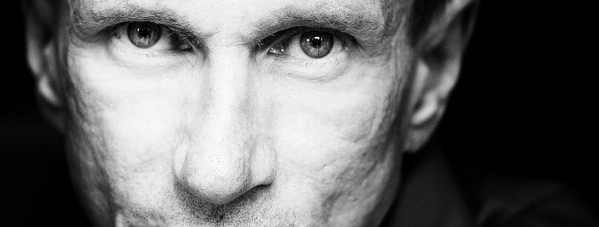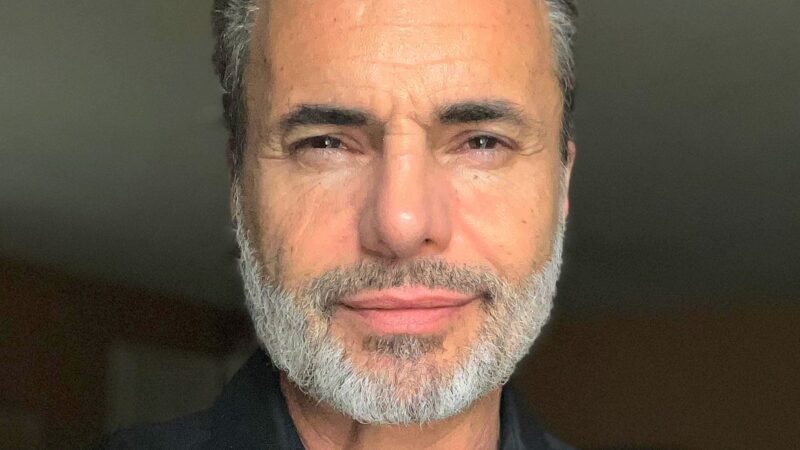I was an obese kid with bad acne who couldn’t throw a football and knew all the answers in Sunday School, so I could not have been more unpopular: I was the fat kid, the ugly kid, the sissy kid and the smart kid – all in one kid! My Grandma told me that God gives everybody at least one gift, and I should try to find mine. I discovered I could do impressions, and started imitating my teachers and principals to stop being picked on. I learned a useful equation: If You Entertain People, They Will Not Hit You! Thus an actor is born.
“We must love one another or die” #WHAuden pic.twitter.com/D2o91TDr9m
— Bill Oberst Jr. (@billoberstjr) July 15, 2016
Did you study acting
I have never taken any formal training in acting. What I know I have learned from doing – being on the road for 14 years as a touring east coast stage actor, and on the sets of 140 film and TV projects over the last six years. Work has been my schooling, and my mistakes my best teachers.
What acting technique do you use
I memorize my lines, find my light and do what the director says.
What wrong impressions do actors hold about acting
Acting is a job. Show business is a business. You’re not allowed to bitch. The unemployment rate in our industry is roughly 98%, so it behooves us all to remember that when we are working, there are thousands of better actors who would gladly take our place. I think that is the proper perspective for an actor. I know it is the only perspective for a working actor.
Do you take courses to improve your craft
I am blessed with a lot of work, so I rarely have time. I am a voracious reader, though, and I’ll read anything related to the craft with great interest. In the end though, one has to figure it out for one’s self. A writer writes. An actor acts. The best way to improve is to fall flat on your face and then ask someone who is more experienced what you did wrong. That kind of education sticks!
What acting books do you read
Best I ever read for camera acting is Michael Caine’s “Acting In Film.” For stage acting I stand by Uta Hagen’s “Respect For Acting.”
How do you keep fit as an actor
Grilled chicken, push-ups, spinach and prayer (although not necessarily in that order.)
How do you prepare for a role, when you get it
I work with the lines first. I write them out, I sing them, I listen to them, I repeat them… until I know the lines at a cellular level. The lines will tell you how they want to be spoken. I work lines until I am so sick of them I could scream. Then I move on to appearance. I need to know what the character will wear and how he will look. Then how he might move or stand. I work from the outside in. I find that if I do all of this, the character starts to speak and move and talk. Then my job is easy.
@Armand_Assante-starrer #StressedToKill headed 2 @MDF_Cannes; rep @MultiVisionnair: https://t.co/raCTlqtGub Trailer https://t.co/FEbyWy8aP0
— Bill Oberst Jr. (@billoberstjr) April 25, 2016
How do you take a character in a script to a honest, believable and breathing person
The person is already there in the script. My job is to listen to him. And to pull him out. If that sounds a bit mystical, it’s because it is. This is not something that can be taught, but something that can be learned. Again, experience is the best teacher. An actor can’t be afraid to look foolish, or to fail. You will look foolish. And you will fail. But you’ll learn.
How do you stay fresh on set
I stay off the grid when I am shooting. No phone, no texting, no Facebook, no mail, no nothing. You can either stay in
touch with the world, or with your character. But you can’t do both.
Describe a memorable character you played
My slave bounty hunter character in the feature film “The Retrieval” is memorable because he is minimal. The film is a period piece, set at the end of the American Civil War, and the man I play is taciturn. That performance is mostly eyes, and is entirely to be credited to the director, Chris Eska, who forced me, against my inclinations, to be still in the frame. I learned the power of cinematic stillness through that experience, and I hope I never forget it.
Explain one creative choice you took on set
My serial killer character on CBS’s “Criminal Minds” kills people by choking them with barbed wire. So you’d expect him to have a hard edge in his voice. But director Matthew Gray Gubler wanted a gentler delivery. I took that note to the extreme and tried a voice and speaking pattern almost like a small child’s. I thought Matthew would say it was too much, but instead he liked the vibe and wanted it even more childlike. You have to be willing to have your choice rejected. Otherwise you are no good to the director. The best directors want a collaboration. They are the boss, but they want you to bring something to the table. So, in a way, failure (or at the least the risk of it) is a big part of an actor’s job, and of their value to a production.
What do you want most from a director
A relationship that is honest. It’s easy to work with someone who tells you the truth, and vice versa.
What actors do you long to work with
Michael Caine!
Why
He gives his eyes completely and without reserve. I hold him to be one of the finest camera actors who ever lived.
What advice would you give to actors
Work hard. Expect nothing. Be grateful when you are working and gracious when you aren’t. A lot of tenacity plus a little talent is a combination that always wins.
Briefly write about your career
I generally play macabre, menacing characters with an undercurrent of melancholy in TV and films, and literary and historical characters on stage. I’m grateful to be working, and I thank the Lord every day for the chance to do what I love for a living.
Website | IMDB | Facebook | Twitter | Instagram | Google+ | YouTube









